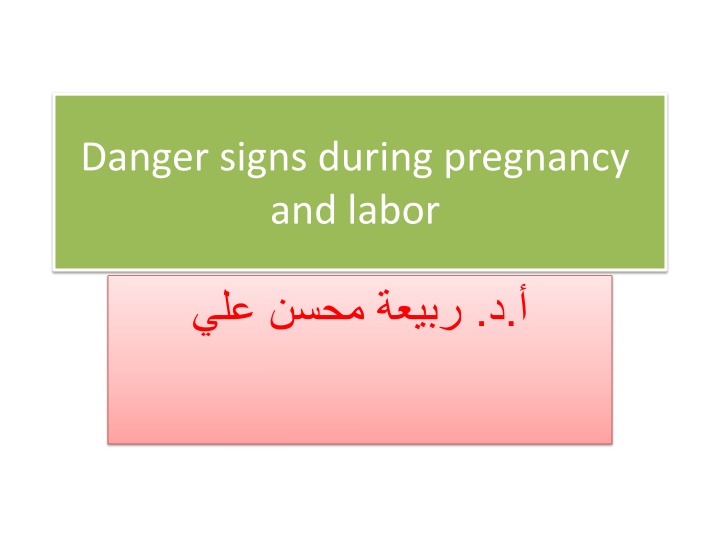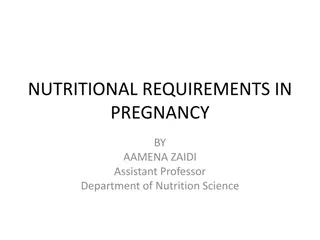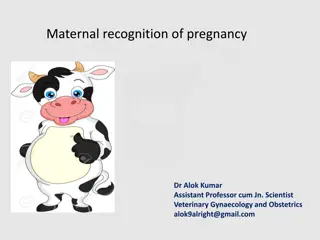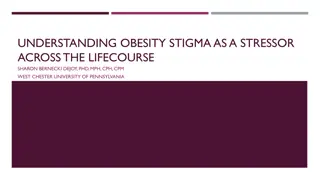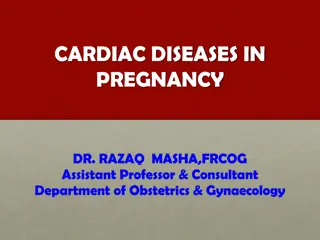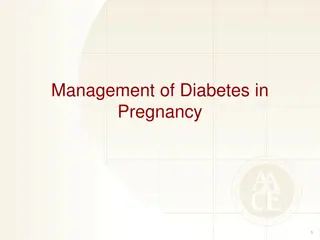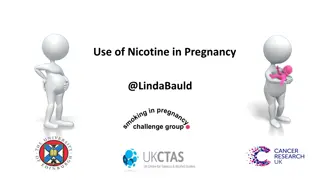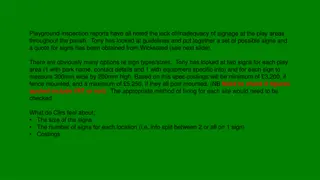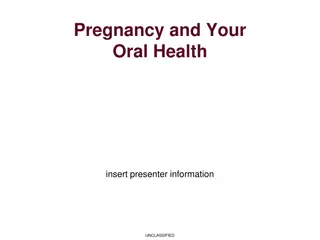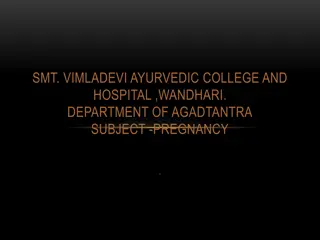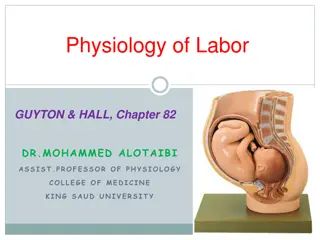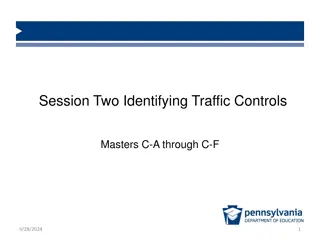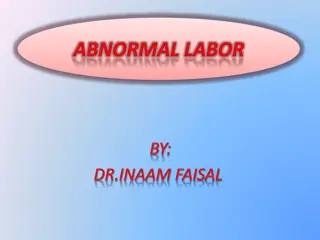Recognizing Danger Signs During Pregnancy and Labor
Common danger signs during pregnancy include decreased fetal movement, persistent dizziness, overheating, heart palpitations, and swelling in the calf, feet, and hands. It is essential to pay attention to these signs and seek medical help promptly to ensure the well-being of both the mother and baby.
Download Presentation

Please find below an Image/Link to download the presentation.
The content on the website is provided AS IS for your information and personal use only. It may not be sold, licensed, or shared on other websites without obtaining consent from the author.If you encounter any issues during the download, it is possible that the publisher has removed the file from their server.
You are allowed to download the files provided on this website for personal or commercial use, subject to the condition that they are used lawfully. All files are the property of their respective owners.
The content on the website is provided AS IS for your information and personal use only. It may not be sold, licensed, or shared on other websites without obtaining consent from the author.
E N D
Presentation Transcript
Danger signs during pregnancy and labor . .
Danger sign during pregnancy . Decreased fetal movement 1 - If you notice that your baby isn't moving around as much as she normally does, stop exercising and take a minute to pay attention to what she's doing. Remember that sometimes it's hard to tell if your baby is moving around when you're moving around, too. Also, be sure to eat and drink water before your workout because that may affect your baby's movements
2. Dizziness Persistent dizziness together with fatigue and headaches can be symptoms of severe anemia or another serious condition. Call your healthcare provider: if you're still dizzy after you've cooled down, rested, and had some water.
3. Overheating If you feel faint or dizzy, or if you develop a headache, nausea, cramps, or a racing heart, your body's telling you that it's having a hard time regulating your internal temperature, which can be harmful to your baby. The baby can get overheated just as you do. When your body overheats, blood flowing to the uterus is diverted to the skin to help the body cool itself off, putting the baby in jeopardy.
Cont.. Call your healthcare provider: if you feel very hot and you have symptoms of overheating, like profuse sweating, dizziness or lightheadedness, a headache, nausea, cramps, or an irregular heartbeat.
4. Heart palpitations If your heart is pounding and you can't carry on a conversation without being out of breath, or if you sweat buckets while you exercise, you're probably working too hard. Heart palpitations may be a sign of dehydration, severe anemia, thyroid disease, or a heart problem.
5. Swelling in your calf feet and hands may puff up a after you exercise, but if you notice calf pain or swelling, it could be a sign of deep vein thrombosis (DVT), a potentially life-threatening condition caused by a type of blood clot. DVT usually affects veins deep in the lower leg and thigh and occurs on one side of the body. You may experience redness and skin that feels warm to the touch.
Also, sudden swelling in your legs (and face and hands), along with high blood pressure, may be a sign of preeclampsia. Call your healthcare provider: immediately if you think you have DVT. If you have DVT and you experience chest pain, difficulty breathing, fainting, or any other serious condition, go to the emergency room right away.
6. Vaginal bleeding Some women do experience light spotting throughout their pregnancy, but vaginal bleeding during pregnancy is always a cause for concern. Early in your pregnancy, it could signal a miscarriage. In the second and third trimesters, bleeding is associated with premature labor and complications with the placenta, such as placenta previa or placenta abruption. All require immediate medical attention.
7. Blurred vision It's common for blood pressure to drop during the first 6 months of pregnancy. But combine low blood pressure with exercise and dehydration, and you may be headed for trouble. If your eyesight gets hazy in the middle of your workout, you may be dehydrated. That alone is enough to send your blood pressure plummeting and your heart into
Cont.. overdrive. As a result, not enough blood may be getting to your developing baby's vital organs. Blurred vision may also be a sign of preeclampsia. This condition can be dangerous for your baby because preeclampsia can severely restrict the flow of blood to the placenta. .
8. Fainting Fainting during pregnancy shouldn't be taken lightly. It could signal something as simple as dehydration or something serious like major circulatory or heart problems. You may not be getting enough oxygen to your brain, which means your baby may not be getting enough either.
9. Recurring pain in abdomen or chest It may just be your ligaments stretching, but you could also be having contractions especially if the pain recurs at somewhat regular intervals. Women experience labor pain differently: For some the pain is similar to a severe menstrual cramp. For others, the pain is sharp and comes in waves or feels like a recurring pain in the back. Abdominal pain accompanied by bleeding might be a sign of placental abruption. You may need to be hooked up to a fetal monitor so your healthcare provider can determine whether you're in labor.
10. Fluid leaking from your vagina If your underpants are constantly wet or if you feel watery fluid leaking (or gushing) from your vagina, it could mean premature rupture of the membranes. That can be a signal that your body is about to go into labor.
Danger signs during labor Most women, including women with disabilities, give birth safely. But when something goes wrong during labor and birth, it is very important for a woman to get the care she needs to save her life. (For more information about safe labor and birth and the problems that can arise
Waters break but labor does not start within 24 hours Go to a health center or hospital. When the waters have broken, the risk is much higher that you or your baby could get a serious infection. You may need to get fluids or medicines in the vein (intravenous, IV).
Baby lying sideways Go to a hospital. Do not try to change the position of the baby once labor has started. This can tear the womb or separate the placenta from the womb wall. A baby lying sideways cannot be born without an operation.
Bleeding before the baby is born Go to the hospital right away. If you are bleeding bright red blood, it could mean the placenta is separating from the womb wall or is covering the opening of the womb. This is very dangerous.
Fever Fever is usually a sign of infection. If your fever is not very strong, you may just need fluids. Drink plenty of water, tea, or juice, and try to pass urine every few hours. If your fever is very high and you have chills, go to a health center or hospital. You need antibiotic medicines right away.
Too long labor Go to a health center or hospital. When labor lasts longer than 1 day and 1 night, or if you are pushing hard for more than 2 hours, you may need medicines or an operation for the baby to be born.
Green or brown waters If it is still early labor, or if the mother has not started pushing, it is best for this baby to be born in a hospital. When the bag of waters breaks, the water should be clear or a little pink. Brown or green waters mean the baby has probably passed stool inside the womb and could be in trouble.
Cont.. If the mother is far along in her labor and the baby is going to be born soon, have the mother push as hard as she can and get the baby out quickly. As soon as the baby s head is out, and before it takes its first breath, ask the mother to stop pushing. Wipe the baby s mouth and nose with a finger wrapped in a clean cloth, or use a suction bulb to suck out the mucus. Once the nose and mouth have been cleaned out, the mother can push the rest of the baby s body out.
Pre-Eclampsia (Toxemia of Pregnancy) Pre-eclampsia can lead to seizures and even death. If the mother has any of these danger signs,
go to a hospital right away: strong headache blurred or double vision sudden, steady severe pain at the top of the belly, just below the high point between the ribs overactive reflexes high blood pressure protein in the urine
If the mother starts to have a seizure and you know she does not have epilepsy: Put something under her head to protect it, and put her on her left side if possible. But do not try to hold her down. Keep her cool. Take her to the nearest hospital. A woman who has epilepsy can also get toxemia.
